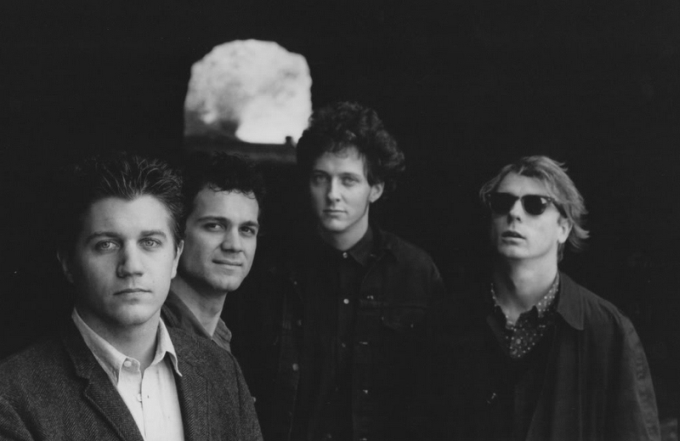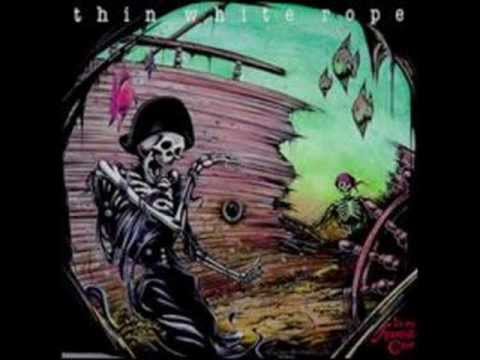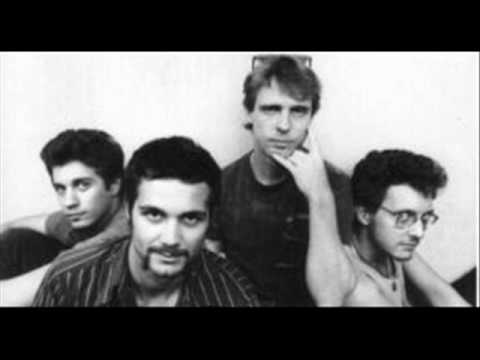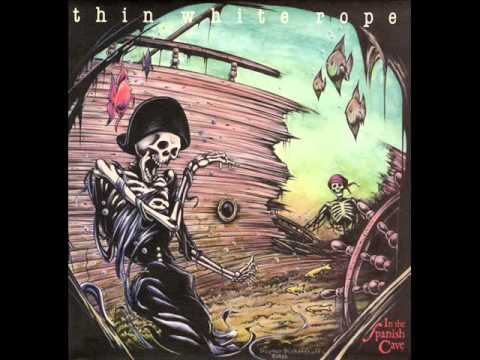Whatever happened to Thin White Rope? It’s a question that I’m guessing a distressingly small number of people ponder these days, but that doesn’t mean it isn’t worth asking.
In the glorious late 80s – when Melody Maker in particular was responsible for introducing UK music fans to a startling parade of genre-defining bands from the US underground, including Sonic Youth, Butthole Surfers, Dinosaur Jr, Throwing Muses, Pixies etc – Thin White Rope were hotly tipped as a serious contender in the post-hardcore/’new rock’ scene that was set to free us from the fey tyranny of C86 jangle and a legion of Smiths’ impersonators. Indeed, Melody Maker once likened them to "a six-string musical jihad" (clearly during more innocent times).
Yet despite a series of brilliant records, a reputation for incendiary live shows, and even snagging a major label deal, fame and fortune (or at the very least, ongoing cultural/critical acknowledgement) didn’t happen for Thin White Rope, and they called it a day in 1992 – The One That Got Away, the title of their posthumous live album, says it all.
But Thin White Rope absolutely deserve a second look and for their formidable music to be reappraised. Wikipedia quotes The Rough Guide to Rock’s description of them as “traditional American guitar rock”, but this entirely misses the point of why they remain so special. Yes, their sound might be more identifiably “American” than some of the bands mentioned earlier – but what makes Thin White Rope different is the way they reconfigure this sound, creating an alien take on the unfathomable vastness of the American landscape and its effects on the nation’s psyche.
Because what we’re essentially talking about here is the original desert rock sound, a powerful blend of heavy riffs, feedback-inflected psychedelia and the lonesome twang of the frontier that predates the likes of Kyuss, Queens Of The Stone Age etc. However, we’re in a different place conceptually from how desert rock is described today. For bands such as QOTSA, the desert represents a sense of freedom from the genre restrictions imposed by corporatized rock. But for Thin White Rope, the desert is uncanny and unsettling, alive with both ancient resonances and future prophecies. It’s a place of UFO cults, 50s sci-fi movies and atomic test sites, the infernal crucible of the 20th Century.
Thin White Rope’s identification with the weirdness of the wilderness was apparent from the off. The opening track on their debut album Exploring The Axis is ‘Down In The Desert’, a cautionary tale of a man walking out on his hometown and going south, only to return "very quietly", the insistent chorus warning that "something affected him down in the desert".
But this sense of wide open spaces and the mysterious forces at work within them is best expressed by the band’s music itself, a sandstorm of electrifying guitar play powered along by some very big drumming. And then there’s the voice. Bandleader Guy Kyser has one of rock’s most distinctive larynxes, producing a guttural yet tremulous vocal that sounds like Bob Dylan undergoing satanic possession. Combined with his elliptical, sometimes brutal, lyrics, Kyser channels the vision of that man scarred forever by some terrible insight.
Released in 1988, In The Spanish Cave was Thin White Rope’s third album, following their critically-acclaimed second long player, Moonhead. While for many people Moonhead remains the band’s masterpiece and most coherently realised album, it’s an angry and intense record that takes a few listens to really penetrate and appreciate. In contrast, In The Spanish Cave has more light and shade and a much wider musical palette, and while Kyser’s worldview remains dark verging on paranoiac, the album is perhaps a more rounded representation of the band’s unique talents.
(At this point, I feel the need to make a couple of tangential observations about Thin White Rope. Firstly, from the band name onwards – William Burroughs’ euphemism for ejaculation in The Naked Lunch – there’s a strange scatological obsession apparent in their album titles: the name listed on the spine of this one is Captain Long Brown Finger In The Spanish Cave, while their major label follow-up was called Sack Full Of Silver, and a previous mini-album had been titled Bottom Feeders. Secondly, just about everyone that passed through the Thin White Rope ranks had a Germanic-sounding surname: on In The Spanish Cave we’ve got Kyser, Kunkel, Von Feldt and Becker, while in other line-ups, there’s Tesluk, Abourezk and Odom. And no, I have no idea what it all means either…)
The first thing that In The Spanish Cave does is wrong-foot the listener. While Moonhead kicked off with the bone-crushing ‘Not Your Fault’, a fair indication of what was to follow, here we get ‘Mr Limpet’, a frantic piece of cowpunk inspired by a 1964 live action/animated film [The Incredible Mr Limpet] about a man who turns into a fish and helps the Allies defeat the Nazis in the Battle of the Atlantic (and if you think that sounds bloody odd, there’s a rumoured remake in the pipeline with Richard Linklater attached). It’s an upbeat, almost light-hearted, start to the album, but a volley of depth charge guitars midway through presage stormier waters ahead.
‘Timing’ takes us back into more familiar territory, its grimy, churning riff and murky bottom end buttressing more melodic verses. It’s also the first time we get to hear the slippery, coiled interplay between the guitars of Kyser and Roger Kunkel, ghosting each other’s lines before peeling off to lazily execute a lick or squeeze out some feedback. But it’s on the next track where things begin to get really heavy…
It starts with those guitars again, weaving around each other like a distant fire on the horizon, slowly fading up, approaching, getting near, and then… JESUS CHRIST ALMIGHTY, what in God’s name is that? It’s the opening riff of ‘It’s OK’, spewed forth with one of the dirtiest, ripped-from-the-bowels-of-hell guitar sounds ever. There’s a pounding drum roll, and then we’re off on a throbbing, trance-inducing, space-rocking ride that still brings the hairs up on the back of the neck.
‘It’s OK’ (and it’s really not) is actually a relationship song, though one informed by the apocalyptic logic of Kyser’s imagination. “My old girlfriend made new friends, got happy deep inside”, he sings, before proclaiming in the chorus that, “It was a genetic thing, how she turned to you. Outside forces run her dreams and nature’s choice come true.” (And you know what, I remember using the same logic myself after hearing this song, a comfortingly ‘scientific’ explanation for failing in love. Who says music can’t save you…)
‘It’s OK’ blasts down the synaptic highways, a thing of both terror and awe, before locking into a monumental end groove that the band proceed to demolish with searing feedback and a hammering counter-riff. This is one of those tracks it’s simply not possible to play loud enough.
After that, there’s a brief chance to get your breath back with ‘Ahr-Skidar’, a short solo piece from Kyser that flirts with Eastern scales while musing that “certain people will take doses of pleasure ‘til they die”. And then we have perhaps Thin White Rope’s most compelling claim for a place in the alt rock hall of fame…
Barrelling into view astride a sturdy chukka-chukka riff, ‘Red Sun’ bursts through the clouds and gives full vent to Thin White Rope’s twisting, roiling, super-dense take on psychedelia. Released as the lead track on an EP put out concurrently with the album (which features a blistering, must-hear cover of ‘Some Velvet Morning’), ‘Red Sun’ performs the same counter-intuitive trick as Bowie’s ‘Sound And Vision’, revelling in its awesome instrumental theme for a good two minutes (in a four minute song) before Kyser even opens his mouth.
And when he does, we get, “Well, I hate to see the red, red sun go down,” then the same line repeated, and blimey, does Kyser sound pissed off at nature. He puts on his best very reasonable/completely insane voice to intone, “I’ve become convinced that you’re the one…” before the guitars light up the sky again. And just when you think it can’t get any better, the theme’s taken up by a fanfare of mariachi horns, sealing the deal for ‘Red Sun’ as the soundtrack to some dream Sergio Leone western.
Despite having nothing that even vaguely resembles a chorus, ‘Red Sun’ is just a perfect rock single by anybody’s standards, which makes it all the more perplexing that the song and the band that made it have been all but deleted from the musical timeline.
Still, back in 1988, it’s time to flip the vinyl over and drop the needle on side two. ‘Elsie Crashed The Party’ careers out of the speakers sounding not unlike a saloon bar altercation between the Charlie Daniels Band and King Crimson, the guitars slugging it out like violent drunks. The rabble-rousing verses give way to a threatening chorus full of sinister portent, before Kyser spits out the final lines in true morning-after-the-night-before bafflement and horror: "We broke the law and left the porch light on and the sun is brighter than a hydrogen bomb. Thirsty and damaged, I answer the door to Elsie my creation, my creature from the north!"
‘Ring’ is a classic exercise in hold and release, the confident bass riff that opens the song soon giving way to a darker passage that ratchets the tension up, the listener forever unsure which direction the band are going to move in. As it is, we get one of Kyser’s more restrained vocals, an almost wry meditation on the mind-bending effects of unchecked consumerism, our Golem-esque protagonist concluding, "I wish that I could turn the sunset into cash."
Just to prove that it isn’t all fire, brimstone and psychosis in Thin White Rope’s world, ‘Astronomy’ is next, which finds the band in a positively wistful mood. Kyser wakes to find himself "riding on a falling moon", while a country-ish melody rises and falls around him like Neil Young at his most hymnal. You’ll swear that you’ve heard it somewhere before, but just in case you’re getting too comfortable, the band suddenly drops away, exposing the vulnerable female backing vocal and ending the song on an unresolved note.
That air of unease continues through the opening section of ‘Wand’, Kyser crooning about the titular instrument of doom being "culled from a visit to the valley of the bones". And then his eyeballs roll back in his head, and with a blood-curdling “Oh Lord, yeah!”, he conjures up his own particular take on the end of the world. The band thrash along like occult evangelists at a revival meeting while Kyser vividly paints a series of gruesome images: “Border guards everywhere turn and suck their guns. Every leader is sterilized along with his firstborn son.” The song builds to a boiling climax, the guitars spurting like molten rock across the scenery as the final curtain falls.
But not quite. The album’s actual closing number is ‘July’, and yes, this is the closest they get to classic American rock, all chiming tremolo and Hammond organ. But as ever, here’s Kyser to unsettle the listener with his talk of erasing “the scent of your sadistic man” as he catalogues the hurt inflicted on an unnamed woman. Halfway through, Kyser can contain his anger no longer, and the song shifts up a gear to match his ire. It’s during this extended rant that Kyser delivers perhaps the album’s creepiest couplet: “Your father was the artist who took pictures every day of you, and made a stop-motion film that shows you turning into him.” His frustration spent, the song reverts to its original melody, bringing the album to a graceful conclusion.
In The Spanish Cave still feels like a potent, fantastical window onto a malign new phase of the American Dream, many of the songs seeming to reflect and comment on the emerging technocracy growing up around the band’s Californian base in the late 80s. Thin White Rope made music that dissected the Silicon Valley state of mind, and all that implies: technology as a way of life, capitalism as a religion, individuals increasingly alienated by systems beyond their understanding. The desert’s revenge…
So why should we be remembering Thin White Rope and this album 25 years on? While many of their contemporaries were pushing at the sonic boundaries of rock, there’s something primordial, almost feral, about Thin White Rope’s music that makes it timeless and still relevant. It’s also excitingly strange without being inaccessible, and much of that appeal is down to Guy Kyser – with the possible exception of Steve Albini, I can’t think of anyone who had such an eloquent and singular vision of the world during this particular period of US rock resurgence.
Today, Kyser is a respected botanist and weed science expert, while his former band’s discography lies neglected in the dust. These things happen, but let’s hope that a seed gets planted somewhere that allows Thin White Rope to blossom again and assume their rightful place as a true visionary in the annals of alternative rock.






